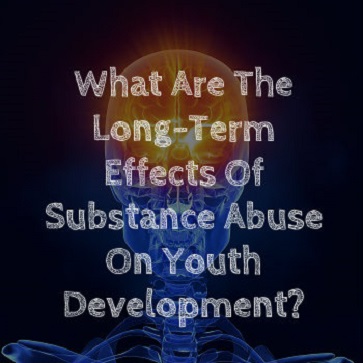The Long-Term Effects Of Substance Abuse On Youth Development
When you look at the numbers, it can be discouraging to see how many teenagers continue to experiment with drugs and alcohol as this often leads to addiction. What most teens have difficulty comprehending is how this behavior could affect them for the rest of their lives.
Types Of Drugs Teens Experiment With
 Just over one million American teenagers are addicted to illegal drugs, with another 915,000 addicted to alcohol. Even if they’re not addicted, an alarming number of teens are regularly using, with over half of high school seniors reporting having experimented with drugs and close to 30 percent having tried something other than marijuana, like heroin, cocaine, prescription drugs, inhalants, sedatives and mind-altering hallucinogens. The highest rate (19.9 percent) of illegal drug use occurs between 18 and 20 years, with the next highest rate (16.4 percent) happening between 16 and 17.
Just over one million American teenagers are addicted to illegal drugs, with another 915,000 addicted to alcohol. Even if they’re not addicted, an alarming number of teens are regularly using, with over half of high school seniors reporting having experimented with drugs and close to 30 percent having tried something other than marijuana, like heroin, cocaine, prescription drugs, inhalants, sedatives and mind-altering hallucinogens. The highest rate (19.9 percent) of illegal drug use occurs between 18 and 20 years, with the next highest rate (16.4 percent) happening between 16 and 17.
Alcohol use affects more than 10 million teens, with 5.1 million regularly binge drinking, which is defined as downing more than four or five drinks during a single sitting. Not far behind is inhalant abuse, with 25 percent of all teens 10- to 17-years-old saying they have friends who inhale dangerous fumes from things like paint, computer cleaner or glue.
Teen Drug Use Can Have Negative Effects For Years To Come
Unfortunately, the bad choices made in youth can haunt for years to come. The brain undergoes vital development during adolescence. Not since infancy has their brain been changing and forming with such rapidity.
Drug use can disturb the proper development of the prefrontal cortex in the brain. This area of the brain is responsible for important functions like organization, risk assessment, impulse control, consequence prediction and planning. But the limbic system, corpus callosum, hippocampus and cerebellum are all still forming and vulnerable to the changes wrought by drugs. Functions like emotional control, goal-setting and memory/recall are all still developing, and drug use could cause permanent problems in these areas.
Studies have repeatedly shown that heavy marijuana use damages key brain functions for years, with some researchers believing the changes are permanent. Processes like critical thinking, planning and complex attention are all shown to be diminished by heavy marijuana use. Girls seem to experience longer-lasting ill-effects, but both females and males show problems with myelin sheath formation, which affects brain signaling.
MDMA, which also goes by Molly and ecstasy, is associated with sensations of euphoria and social bonding, which is why it’s popular with young people attending large group gatherings such as concerts and dance clubs. Ironically, lowered serotonin levels as long as seven years have been observed in laboratory animals after they’ve been given MDMA, with serotonin closely associated with emotional happiness.
Alcohol causes harm to adolescent brains as well, especially binge drinking. Heavy drinking in teens has been shown to lower their ability to problem solve and understand spatial relationships, as well as memory and vocabulary impairment. And just like drugs, alcohol affects the limbic system, meaning emotional well-being is disrupted. In fact, there appears to be a connection between drinking and behavioral problems due to a lack of emotional control — researchers just aren’t sure which problem came first.
Using drugs and alcohol during adolescence can have serious and long-lasting results, with neurological development issues, impaired social development and addiction. And all of these problems can easily follow teens into adulthood.
Read More About The Effects Of Teen Substance Abuse On Families



